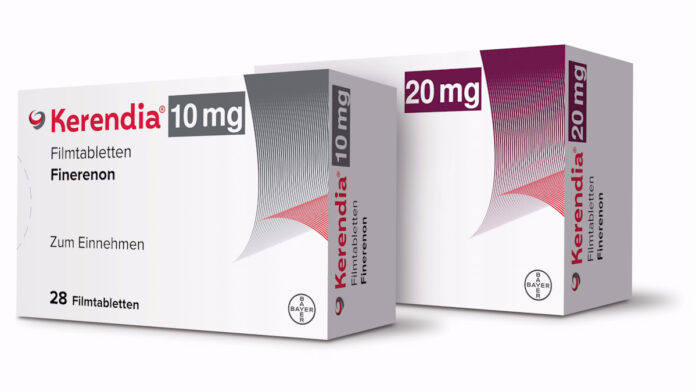WHIPPANY, N.J.– The U.S. Food and Drug Administration has approved Bayer’s KERENDIA® (finerenone) for the treatment of adults with heart failure (HF) with left ventricular ejection fraction (LVEF) ≥40%, expanding the drug’s reach to an estimated 3.7 million Americans living with this form of heart failure. The approval follows a Priority Review of Bayer’s supplemental New Drug Application and marks a major milestone in heart failure treatment.
KERENDIA is now the only non-steroidal mineralocorticoid receptor antagonist (nsMRA) approved for this patient population, which includes those with mildly reduced and preserved ejection fraction (HFmrEF and HFpEF). The approval is based on results from the Phase III FINEARTS-HF trial, which showed that adding KERENDIA to standard care reduced the relative risk of cardiovascular death and total heart failure events by 16% compared to placebo.
“This approval expands treatment options for a large and growing group of patients with poor prognosis,” said Dr. Scott D. Solomon, Professor of Medicine at Harvard Medical School and Chair of the FINEARTS-HF Executive Committee. “Based on the clinical efficacy observed, finerenone can become a new pillar of comprehensive care.”
In the FINEARTS-HF study, KERENDIA demonstrated consistent benefits across all subgroups, including patients with or without use of SGLT2 inhibitors. The trial included nearly 6,000 patients and assessed the drug’s effect on the composite endpoint of cardiovascular death and total (first and recurrent) heart failure events over a period of up to 42 months.
KERENDIA works by selectively blocking overactivation of mineralocorticoid receptors in the heart and kidneys. Bayer noted the drug’s safety profile remained consistent with prior indications. Common side effects observed in ≥1% of patients included hyperkalemia (9.7% vs. 4.2% with placebo), hypotension (7.6% vs. 4.7%), hyponatremia (1.9% vs. 0.9%), and worsening renal function (18% vs. 12%).
“Even with current treatments, many patients still face a high risk of hospitalization or cardiovascular death,” said Dr. Alanna Morris-Simon, Senior Medical Director of U.S. Medical Affairs at Bayer. “Now, as a core pillar of treatment, KERENDIA can help reduce these risks.”
Since its initial approval in July 2021 for patients with chronic kidney disease (CKD) associated with type 2 diabetes, KERENDIA has been recognized for its cardiovascular and renal benefits. The new indication extends those benefits to a broader heart failure population.
The FINEARTS-HF trial is part of Bayer’s larger MOONRAKER program, which includes over 15,000 participants worldwide and is designed to evaluate KERENDIA across a wide range of heart failure patients and clinical settings.
Detailed results from the trial have been published in the New England Journal of Medicine, and Bayer plans to continue expanding the evidence base for KERENDIA as a treatment for both heart and kidney conditions.


